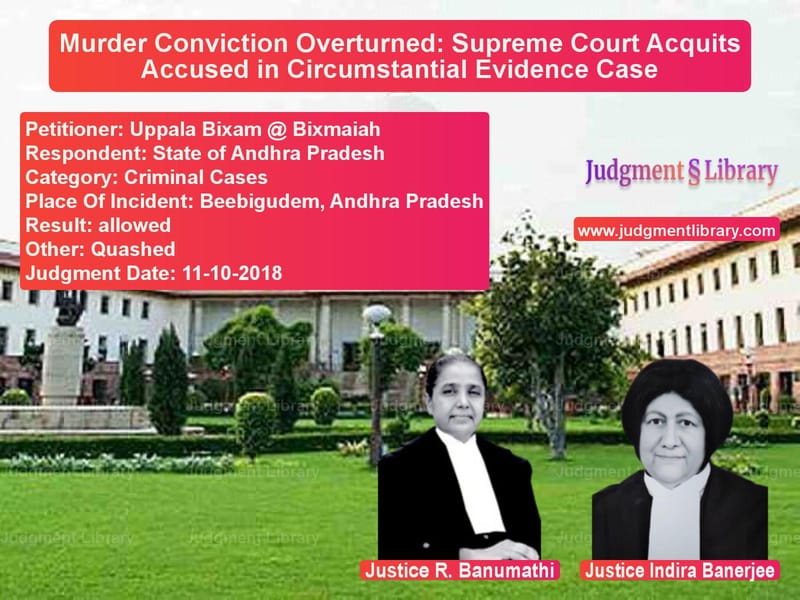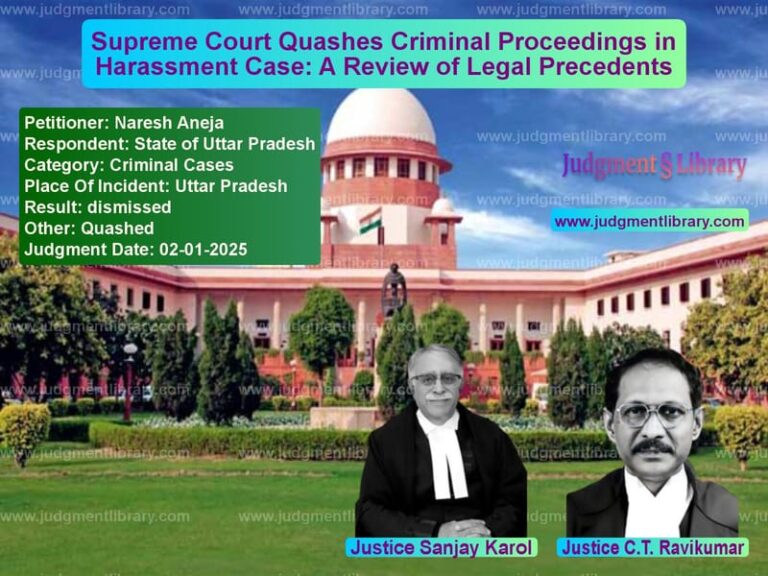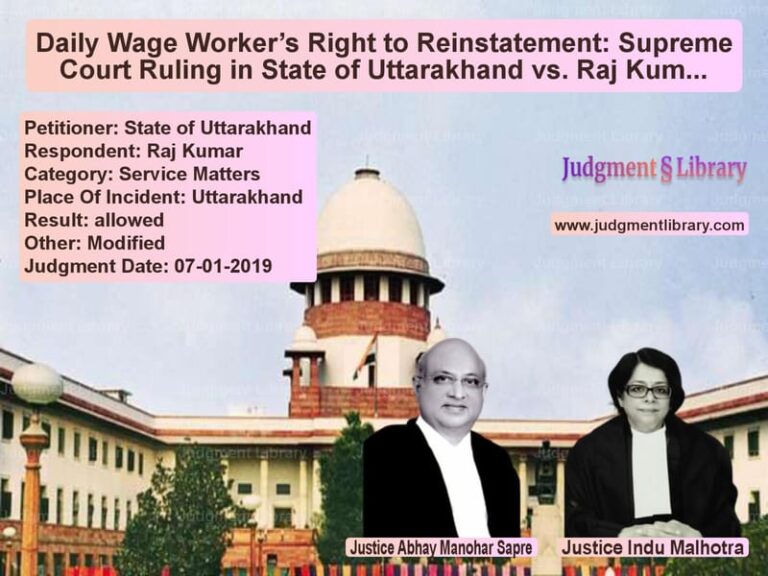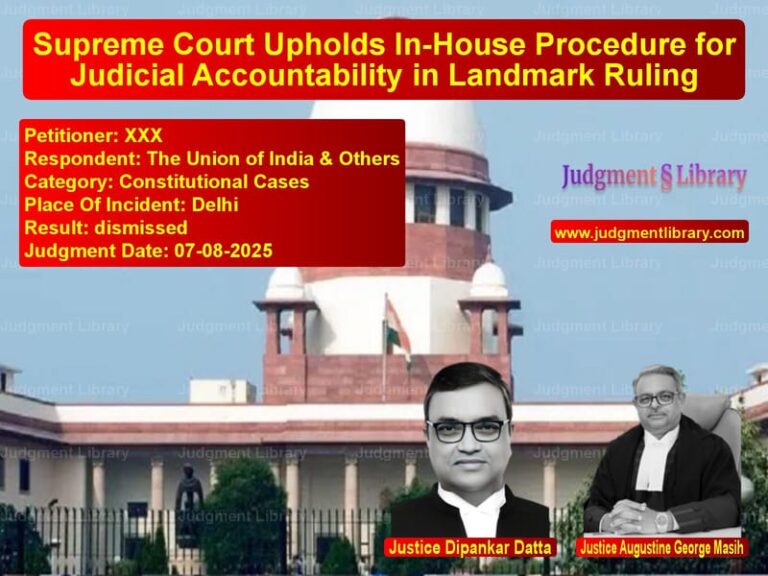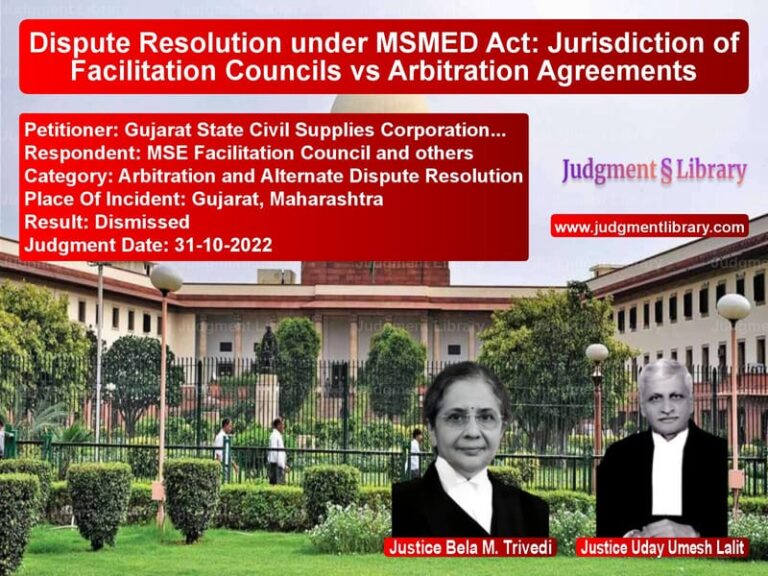Murder Conviction Overturned: Supreme Court Acquits Accused in Circumstantial Evidence Case
The Supreme Court of India recently delivered a crucial judgment in a murder case, acquitting the accused, Uppala Bixam, due to a lack of sufficient evidence. The case, which originated from an incident in 2000 in Andhra Pradesh, involved the mysterious disappearance and subsequent murder of a shepherd named Ramesh. The prosecution relied heavily on circumstantial evidence, but the Court found it inadequate to sustain a conviction.
Background of the Case
The case revolves around the disappearance of Ramesh, a shepherd, who went missing on January 27, 2000. He had taken 19 sheep to graze on the outskirts of Beebigudem village but never returned home. His family began searching for him the next day and discovered that three of his sheep were in the possession of a person named Shaik Naseem (PW-9). Naseem informed them that he had bought the sheep from Lingaiah (PW-5), who in turn had received them from the accused, Uppala Bixam.
Following this discovery, Uppala Bixam was arrested on January 29, 2000, initially under Section 379 IPC for theft. During interrogation, the police claimed that he confessed to the murder, leading to the recovery of Ramesh’s body from under a culvert. Based on this, the police also charged him under Sections 302 and 201 IPC for murder and destruction of evidence.
Key Issues Raised
- Did the prosecution establish a clear and direct link between the accused and the murder?
- Was the confession made by the accused admissible in court?
- Did the circumstantial evidence conclusively prove the accused’s guilt?
- Was the High Court correct in upholding the conviction despite the lack of forensic evidence?
Arguments of the Petitioners (Uppala Bixam)
- The defense argued that there was no direct evidence linking the accused to the murder.
- The alleged confession made during police custody should not be considered as conclusive proof of guilt.
- The prosecution failed to prove that the sheep recovered from various individuals belonged to the deceased.
- The recovery of the dead body was not sufficient evidence to convict the accused of murder.
Arguments of the Respondents (State of Andhra Pradesh)
- The prosecution claimed that the accused’s confession led to the discovery of the victim’s body, which pointed towards his involvement.
- The accused’s possession of the victim’s stolen sheep further indicated his role in the crime.
- Eyewitnesses confirmed that the accused had sold the sheep shortly after the victim’s disappearance.
- Despite the lack of forensic evidence, the chain of circumstantial evidence established the accused’s guilt.
Supreme Court’s Analysis
The Supreme Court critically examined the prosecution’s case and the evidence presented. It emphasized that in cases based on circumstantial evidence, the following principles must be satisfied:
- The circumstances must be cogently and firmly established.
- The circumstances should have a definite tendency unerringly pointing towards the guilt of the accused.
- The circumstances must form a complete chain that leads to only one conclusion: the accused’s guilt.
In this case, the Court found several gaps in the prosecution’s arguments:
- The alleged confession was denied by the accused in his statement under Section 313 CrPC, and there was no independent corroboration.
- The prosecution failed to prove that the recovered sheep actually belonged to the deceased.
- The fact that the body was recovered at the accused’s behest was insufficient to establish guilt beyond a reasonable doubt.
- The police took two days after the victim’s disappearance to recover the body, raising questions about the reliability of the investigation.
The Court cited its own precedents, stating:
“Suspicion however grave cannot take the place of proof. There is a wide gap between ‘may be’ and ‘must be’ which must be bridged by clear, cogent, and unimpeachable evidence before an accused is convicted.”
Since the circumstantial evidence was not conclusive and left room for doubt, the Court held that the accused was entitled to an acquittal.
Final Judgment
The Supreme Court set aside the High Court’s ruling and made the following key findings:
- The conviction under Sections 302 and 201 IPC was overturned due to lack of concrete evidence.
- The alleged confession made by the accused was not supported by any independent evidence and could not be relied upon.
- Since the motive for the murder was purportedly theft, but the accused had already been acquitted of theft, the murder charge became even more doubtful.
- The accused was granted the benefit of the doubt and was ordered to be released immediately unless required in another case.
The judgment stated:
“The circumstance of recovery of the dead body allegedly based on the alleged confessional statement may raise a suspicion against the appellant-accused that he might be involved in the incident, but mere suspicion itself cannot take the place of proof.”
Implications of the Judgment
This ruling has significant implications for criminal cases based on circumstantial evidence. The key takeaways from the judgment include:
- Burden of Proof: The prosecution must establish guilt beyond a reasonable doubt. Mere suspicion or weak circumstantial evidence cannot substitute for direct proof.
- Admissibility of Confessions: Confessions made in police custody must be corroborated by independent evidence to be considered reliable.
- Importance of Forensic Evidence: In cases involving murder, forensic evidence such as ballistic reports or DNA analysis can be crucial in establishing guilt.
- Role of Motive: If the prosecution alleges a motive for the crime, it must be consistently supported by evidence. In this case, the theft motive was weakened when the accused was acquitted of the theft charge.
The Supreme Court’s decision reinforces the principle that an accused cannot be convicted based on weak or circumstantial evidence alone. This ruling sets a precedent for ensuring fairness and due process in criminal trials.
Petitioner Name: Uppala Bixam @ Bixmaiah.Respondent Name: State of Andhra Pradesh.Judgment By: Justice R. Banumathi, Justice Indira Banerjee.Place Of Incident: Beebigudem, Andhra Pradesh.Judgment Date: 11-10-2018.
Don’t miss out on the full details! Download the complete judgment in PDF format below and gain valuable insights instantly!
Download Judgment: Uppala Bixam @ Bixma vs State of Andhra Prad Supreme Court of India Judgment Dated 11-10-2018.pdf
Direct Downlaod Judgment: Direct downlaod this Judgment
See all petitions in Murder Cases
See all petitions in Attempt to Murder Cases
See all petitions in Bail and Anticipatory Bail
See all petitions in Judgment by R. Banumathi
See all petitions in Judgment by Indira Banerjee
See all petitions in allowed
See all petitions in Quashed
See all petitions in supreme court of India judgments October 2018
See all petitions in 2018 judgments
See all posts in Criminal Cases Category
See all allowed petitions in Criminal Cases Category
See all Dismissed petitions in Criminal Cases Category
See all partially allowed petitions in Criminal Cases Category

